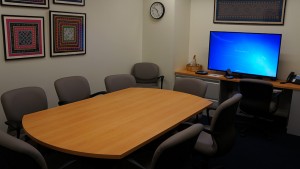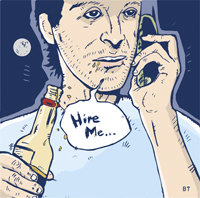Jamie Grant, Associate Director
If you’re considering an internship or applying for full-time positions, chances are you’ll have a phone or video interview at some point in the process. Don’t worry – preparation is really not all that much different than for a face-to-face, in-person interview. Here are a few ideas to help you through, and a great on-campus resource for a quiet interview spot!:
Before the interview:
- Practice – in advance of your interview, try to replicate the scenario as authentically as you can. Have a friend call you and ask you a few questions, or turn on your webcam and (if possible) record yourself answering a question or two (try InterviewStream for this- http://www.vpul.upenn.edu/careerservices/interviewingadvice/practiceresources.php#InterviewStream!). This will give you ideas as to: how loud you may wish to speak; if your speech sounds clear and concise; where you should look if using a webcam to seem most natural; are you smiling appropriately and showing good posture; and other such factors.
- “Dress” the part – while you can certainly conduct a phone interview in your pajamas, it may make you feel more prepared and focused to dress professionally – especially if the interviewer can see you. Do your best to understand in advance the dress code for the industry and the type of employer with whom you’ll be interviewing and choose appropriate attire (at least from the waist up!).
- Check your settings – Make sure your environment is conducive to a successful interview. Do your best to ensure you’ll have relative quiet and a good connection or signal for phone conversations – if you will be home, notify housemates of your interview so they can be quiet, and try to close pets out of the room to avoid distraction. If the interviewer will be able to see you, make sure your backdrop and anything else that can be seen from your webcam is appropriate (your roommate’s unmade bed, a messy desk, or even if your back is to a window on a sunny day and your face is in shadow, may not be helpful).
During the interview:
- Don’t forget to smile – even on a phone call, a smile can be heard.
- Stay present during the call – remember that your interviewer over the phone can’t see a nod or know intuitively that you’re following along – try to interject some listening sounds, such as “hm” or “yes” as your interviewer speaks – this also helps to ensure both participants that your connection is working well. Avoid any distractions that could take you away from the call – instant or text messaging, or doing anything at your computer other than engaging with your interviewer (they can hear you typing!).
- Don’t be afraid to help yourself – put up post-it notes, have your resume, cover letter and the job description in front of you, have your list of questions all written out or typed out on your screen.
- Address any technical issues immediately – If you’re having difficulty hearing, think the connection is poor or otherwise need to make an adjustment, address it as early as possible with your interviewer – it’s simple to hang up and click off and reconnect and may reflect well on your problem solving initiative!
 Need Interview Space for your Phone or Video Conference?:
Need Interview Space for your Phone or Video Conference?:
- Please feel free to inquire with the receptionist in our office about reserving our dedicated video/phone conference room, “Room 70,” for your interview!
For a few more tips, be sure to visit our site: http://www.vpul.upenn.edu/careerservices/undergrad/interviewing.html#phone








